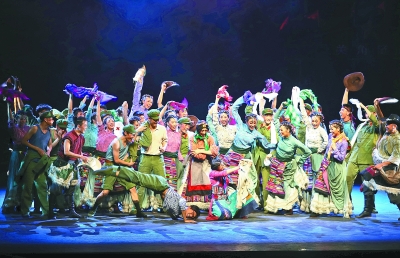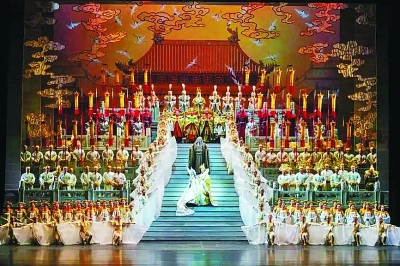Beijing Forum of 2019 World Theatre: Let Excellent Works Communicate in the World


The "2019 World Theatre Beijing Forum" hosted by national centre for the performing arts was held in Beijing a few days ago. With the theme of "communication, cooperation, sharing and win-win", this forum invited more than 200 managers and artists from nearly 90 art institutions in more than 20 countries and regions around the world to gather together, and conducted in-depth discussions on the practical problems faced by theater development, such as "new concept of theater operation and management", "art education and audience training" and "the future road of artistic creation and production".
This forum has laid a good foundation for deepening cooperation, exchange and mutual learning among theaters. The Beijing Declaration was issued on the closing day of the forum. Representatives of the participating art institutions unanimously supported the establishment of the exchange and cooperation mechanism of the Beijing Forum of World Theatre and explored the establishment of the World Theatre Alliance, with a view to better promoting the formation of in-depth, standardized and normalized exchanges and cooperation among institutions.
1. The spread of digital technology makes good works equal to good box office.
Good works are not equal to good attendance. During the forum, almost all the guests mentioned in their speeches that the urgent task of theater development is to attract audiences, especially young people, by using various means as much as possible. Xia Manning, Director-designate of the International Development Department of the Paris National Opera House, said: "France once conducted such a survey, and the results showed that among 50 French people who wanted to watch various performances, only 8 would choose classical concerts and 8 would choose dances, while only 4 would like to listen to an opera."
In the forum, many guests thought that if the theater is to be forward-looking, it must use Internet technology and means to attract young audiences. It has become a trend to use Internet technology and live broadcast to promote art communication. When sharing operational experience, the guests mentioned the role of digital technology in broadening the field of opera communication and audience.
George FairTerhalle, general manager of the Berlin Opera Foundation, talked about his own understanding. "Our mission is to root the opera art form in the fast-paced society and introduce the opera to a wider audience as much as possible by using digital tools.". On the road of spreading opera art by using digital technology, the European Opera Union shared their experience. In October 2017, the European Opera Union joined 29 member institutions to build the online platform opera vision. So far, it has provided 71 performances, 170 videos and more than 3 million web pages for opera lovers, and each work has been viewed 24,000 times on average.
Hou Keming, director and professor of Beijing Film Academy, shared the application of the world-leading "4K+5G" technology in the theater live broadcast. In May, the original national dance drama "Tianlu" was staged at the National Grand Theatre, and the world’s first "4K+5G" live broadcast was also conducted at the Capital Cinema. At the same time, the live broadcast is also presented simultaneously on the mobile phone, TV big screen and other channels.
Using Internet technology and live broadcast to promote art communication has reached a global consensus. Yu Xiaogang, deputy editor-in-chief of Beijing Daily, affirmed the value of digital technology for art communication: "Many audiences may not have been to the concert hall or listened to the concert before, but online live broadcast has brought them the opportunity to enter and feel the art. From offline to online, elegant art has attracted more audiences through grounded communication, realizing online feedback. They may enter the physical theater from the online theater, and if this continues, a virtuous circle of art communication will be formed. "
2. Strengthen the talent pool to maintain creative vitality.
How do art institutions attract audiences? Wu Han, artistic director of the Chamber Music Association of Lincoln Center in the United States, enthusiastically shared her answer: "Provide enough wonderful performances." In Wu Han’s view, art institutions "must show the best and best art form and make the concert unparalleled in order to make the audience love this art form". The guests at the meeting agreed with her that stage presentation is the core foundation of the existence of the theater, and always maintaining the high quality of performances and constantly promoting artistic innovation is the fundamental driving force for the sustainable development of the theater. If you want to keep your creativity alive all the time, you must constantly pay attention to talent training and strengthen talent reserve.
Chen Ping, director of China Theater Development Research Center, said: "With the increase of the number of theaters, we need the following kinds of talents, namely, directors, conductors, screenwriters and other performing arts creative talents and performing arts talents, as well as theater production, performance management, publicity and marketing and other performing arts management talents. We especially need compound talents who understand art and are good at management. "
Anna Weber, general manager of the art and operation of Carnegie Hall in the United States, said: "In addition to commercial performances, Carnegie Hall has many related projects to train talents. For example, the NYO National Youth Symphony Orchestra includes the best American musicians between the ages of 16 and 19. Every summer, they train together and tour internationally. Our goal is to change people’s lives through music. "
In his speech, Xinyi Chen, director of Turandot, the national version of the opera, stressed: "The purpose of creation is by no means business and money, and social responsibility comes first. It is an artist’s responsibility to lead the masses to follow you and pursue truth, goodness and beauty at a high level." Inheritance is the foundation of development. Young actors must first inherit the fine traditions of the older generation of artists in order to truly create masterpieces that the audience loves.
3. Cultivate loyal audience with art popularization
Christopher Weidauer, Minister of Digital Development in vienna state opera, Austria, shared a set of research conclusions based on 4,000 samples — — The reason why people don’t want to walk into the theater door is that they are psychologically distant from elegant art. The purpose of art education and popularization is to change people’s idea that they are not suitable for elegant art, so that more people can enjoy art and cultivate their hearts.
Jorge Hernan Codimeno, director of publicity of Cologne Theatre in Argentina, said: "If we can’t get more audiences to the scene, we will use performances to find more audiences." Cologne Theatre opened its doors through social media and established contact with people, thus breaking the public’s prejudice against elegant art. Margaret Moran, Chairman of the Board of Directors of the Philippine Cultural Center, also emphasized the role of the popularity and application of the Internet in art education. "In the Philippines, art online projects enable people to directly contact artists and art research experts, thus igniting the audience’s interest in art, so that they can not only appreciate art, but also participate in artistic creation."
It has become a trend to put opera on the screen all over the world. In order to make opera, the jewel in the crown of music art, benefit ordinary people, the National Centre for the Performing Arts has experimented with the production of high-definition and 4K opera films, and so far 28 opera films such as Turandot, Camel Xiangzi and Long March have been filmed. In 2018, the National Centre for the Performing Arts produced the opera film "The Dawn is Quiet Here", which is the first 4K panoramic opera film in China. Li Zhixiang, vice president of the National Centre for the Performing Arts, said: "The National Centre for the Performing Arts has been trying to combine theaters with the Internet with the help of science and technology, so that the stage art resources can benefit more audiences. We created a digital audio-visual platform ‘ Classical music channel ’ , carry out free high-definition live broadcasts of heavy performances and opera film production. "
During the forum, NCPA conducted in-depth exchanges and discussions with domestic and foreign theater counterparts, held 45 bilateral meetings, signed 5 strategic cooperation agreements, and reached 19 specific cooperation intentions on a series of contents such as joint production of repertoires, exchange of performances, art popularization and personnel training. During this forum, it coincided with the tenth performance of Turandot, a self-made opera by the National Centre for the Performing Arts. Dozens of representatives from theaters and art institutions around the world watched this work, and they spoke highly of it.
Cormac Simms, Opera Executive Director of the Royal Opera House, said: "This is an exciting and far-reaching forum. No matter which country or region the theater comes from, it is very important to respect each other, learn from each other and learn from each other. We hope to work with national centre for the performing arts to establish a world performing arts alliance. "
Wang Ning, president of the National Centre for the Performing Arts, said: "We sincerely invite our colleagues from all over the world to focus on China and the cultural performance market, and work together to build a community of destiny for the sustainable development of the world’s theaters and make new and greater contributions to the progress of human civilization."
(Reporter Niu Mengdi correspondent Mary)